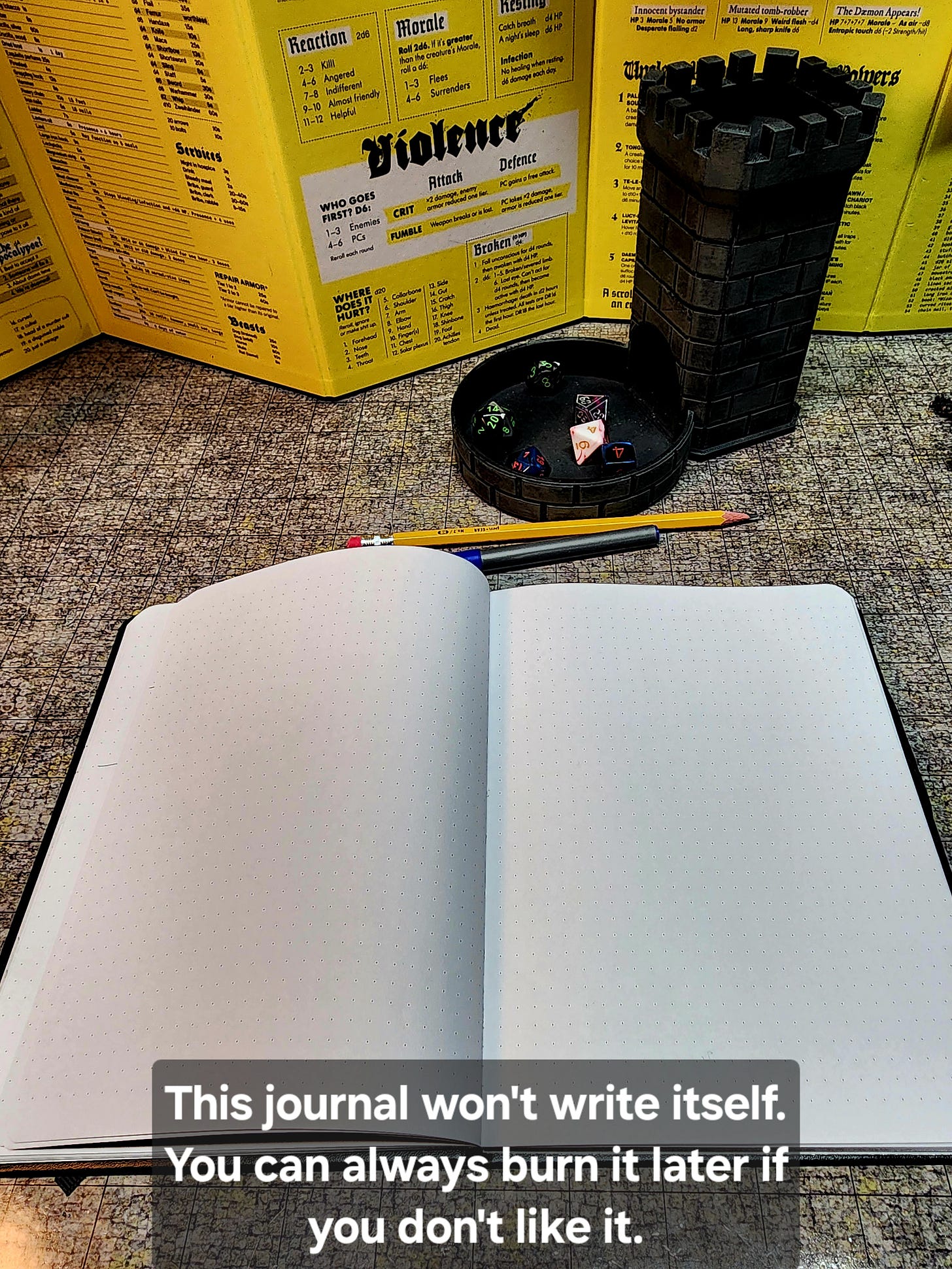Solo RPGs can seem daunting to everyone. From the uninitiated to the veteran players and GMs. Just presenting the idea of playing RPGs alone is enough to fill one’s mind with endless questions:
Where do I start? What if I begin to hate my characters or campaign? What if it’s too hard? Do I need to plan everything in advance? Do I really need to buy ALL those books? Am I even doing this the right way?
Solo RPGs become much more approachable when you realize that you are in control. You choose the tone, the rules, and the way you play. You can sketch your world in pencil and decide later if you want to trace over it in ink. And if you don’t like it, you can always start again.
Before you start, it’s important to prepare your mind for solo roleplaying and get into the right headspace to get the most enjoyment out of your sessions. Perhaps the best place to start with is with yourself. What do you want? What are you willing to do and what do you want to avoid at your desk?
The Philosophy of Solo Play
Forget Perfection—Just Start Rolling
It just needs to be good enough for now. The more you spend time planning how to start, the more playing time slips away. Ultimately, it’s better to create something serviceable and tangible than chase a perfect ideal—a mythical unicorn—that will never materialize because you’re afraid of breaking it. Remember, something broken is easier to fix than something that doesn’t exist. Besides, it’s YOUR game. If you don’t like it, you can always change it or restart with a clearer idea of what you want.
Half the fun of being a solo player is the freedom to change up game mechanics, experiment with new ones, or discard those that aren’t working. Good luck making all those changes in a group of five unless everyone is keen on playtesting. Each session is not only an opportunity to battle monsters, influence NPCs through roleplaying, and explore your world—it’s also a chance to improve your skills in roleplaying, adventuring, world building, and game design. What might seem like mistakes at the desk are actually small tuition payments for learning what you truly enjoy in games—and perhaps even discovering new facets of yourself along the way.
Let the World Move On Without You
Death is the last thing you’d want for your character—but high stakes give their lives meaning. While a heroic last stand has its appeal, there’s also beauty in watching a character’s flaws and vices become the very seeds of their undoing. Even if your characters are doomed, there is tragedy and artistry in witnessing them embrace their fate, while the game world evolves around them. If you want to appreciate your characters as deeply as the heroes in your favorite movies, shows, and books, don’t shelter them from an early end.
Consider Sean Bean, notorious for dying in the first movie of a trilogy or the first season of a series. Think of Boromir, who succumbed to his temptations yet sacrificed himself so the hobbits could escape. Or Ned Stark, executed as a “traitor” for refusing to abandon his principles to defeat the Lannisters. Though these characters died prematurely, their deaths propelled their stories forward and left lasting ripples throughout Middle Earth and Westeros. Your character’s death doesn’t have to be heroic or dignified to carry weight. Whether it’s a crushing, humiliating end—like being struck down by a crossbow while using a latrine—or a glorious last stand, what truly matters is that you leave the desk feeling something.
Each character’s demise is like rolling a natural 20 in the realm of roleplaying. Their passing isn’t an end but a gateway: a built-in story hook that lets you explore the world from a new perspective. Let your character’s remains serve as a marker to the next hero and let their weapons and armor in the hands of the next hero avenge them.
Remember, you are here to explore a world. Your character is a vehicle to explore your world and everything about your character is there to color your perceptions of this world and help you navigate it. Let each interaction your character has teach you something about the setting you are exploring.
Juggling Roles: GM, Player, Worldbuilder—All at Once
I prefer to stick to one system. I value the freedom to improvise as both a solo player and as a Forever GM. Specializing in one system allows me to know its rules—what works and what doesn’t—and gives me the freedom to tinker or improvise on the fly. The books are not the final word; they are there to guide your decisions and spark inspiration.
You may commit to one system, but you’re inhabiting many roles. You are a player and a GM. You control your character while simultaneously constructing every room of the dungeon as you explore. I once thought I would always favor my characters, but then I discovered the excitement of seeing what my dungeons were capable of. Consider the creative hats you’ll wear: writer, actor (making decisions on your character’s behalf), maker (3D printing and painting minis and terrain), world builder, game designer, cartographer, and even occasional sketch artist—even if I can’t draw like Castle Grief…yet.
I used to imagine solo roleplaying as a singularly focused endeavor, but I’ve learned that that’s a massive misconception. I’ve been a jack of all trades my entire life. People often label individuals like me as undisciplined or unfocused—masters of none. But what I’ve discovered is that I can forge unlikely connections between seemingly unconnected ideas, uncovering opportunities that others would ignore. Literally, Thesis + Antithesis = Synthesis.
Finding Inspiration in the Unexpected
The beauty of solo roleplaying is that your best ideas often come when you’re not even sitting at your desk. Inspiration can strike when you’re watching movies or TV—especially when it’s Lord of the Rings, Game of Thrones, or even a horror flick that’s essentially a reskinned dungeon crawl. It might hit you while you’re stuck in traffic or even while doing routine chores like washing dishes or folding laundry. Perhaps the people in your life can live on in your game?
They can be a brother-in-arms that always has your back even in the most desolate dungeons. Or perhaps a friendly bartender that always has the best gossip. They can be an unpleasant NPC with low HP and no witnesses nearby. Or if they are truly that awful they can be the Big Bad. Inspiration lives both within and around you, making even the mundane moments a potential spark for creativity.
I strongly encourage you to seek out new sources of inspiration. This might mean diving into more rule books, blogs, or novels, or catching that TV show or movie you’ve been putting off. Maybe you want to reconnect with your younger self by rewatching or rereading the stories that made you the nerd you are today. Art and music, too, can set the stage for fresh ideas—when I’m short on time for play or writing, I immerse myself in dark fantasy art on Instagram and listen to metal or dungeon synth that reminds me of my favorite encounters. I can’t count the number of times Conan, Dark Throne, Gnoll, and the Bloodborne soundtrack have fueled my sessions and my commute.
Life inevitably gets in the way of playing RPGs—even solo ones. But there are countless ways to keep that creative fire alive. Whether it’s a new monster, a dungeon design, a character concept, or a sprawling conspiracy connecting the scattered pieces of your world, let your everyday experiences be a part of your solo campaign. Challenge yourself to capture these moments—write them down, sketch them, or simply muse on them—so that your daily life continually feeds your campaign.
Your Game, Your Rules, Your Adventure
Solo roleplaying is more than just rolling dice or following a rulebook by yourself. It's an ever-evolving journey of self-discovery, creativity, and flexibility. Embrace imperfection, let the unexpected shape your story, and remember that every decision, mistake, or twist in your campaign serves to enrich your game and your experience. It is these decisions, mistakes, and twists that you will remember the most and keep you coming back for more. Your world is vast, full of hidden narratives and inspirations waiting to be uncovered, both on the page and in the everyday moments of life when you can let your mind wander.
Every role you play—be it as a strategist, storyteller, or world builder—adds another set of skills that will level you up as a creator. Let your game be a canvas for personal expression, a playground for unexpected connections, and a living testament to the art of improvisation.
What advice and wisdom do you have from solo roleplaying that you would like to pass on? I look forward to seeing what you all have to say!
In two weeks, we'll dive into setting up your desk for solo RPGs—because the right environment can be just as crucial in inspiring your adventures as your imagination.







Really enjoyed this article! You offered some safely advice while still reiterating the joy of letting things happen. That’s the key to solo roleplaying, in my opinion. It’s a balance struck between control and giving your characters the space to come alive (or be ruthlessly murdered if fate would have it).
Having a control not always is liberating. I have paralysis analysis.
I have a problem choosing a system for my solo plays. I narrowed my choice as far as possible:
Option A - Shadowdark
Option B - retroclone of odnd - probably WB FMAG but also other retro clones or mixing them (Delving Deeper, Swords and Wizardry and others).
Both options are interesting for different reasons. I am not concerned about existence of dedicated materials for solo play as I rely on 3rd party aids: Tome of adventure design, collection of random tables - especially d4caltrops blog, MUNE oracle and few more.
Shadowdark Pros: it's popular and it is nice to feel to jump into "band wagon". It have modern mechanics that can very easily be adapted to resolving in game situations by testing attribute against difficulty value. You don't need to refer to rules over and over again because they are simple.
Shadowdark Cons: it is not a proper "old game" in terms of mechanics so it does not have pure oldschool charm. There is a lot of low quality content made by the community and it is hard to get really good content in the ocean of average ones. I don't know good way of converting old modules to Shadowdark.
odnd pros: genuine charm of old school! published materials from last 50 years easily adaptable with NO conversion. Simple mechanic in White Box FMAG (simpler than Shadowdark). Excellent execution of "Less is more". It leaves some blank spaces for creating rulings (Odnd is more like a framework that helps you make a game your own)! Amazing flavour of neoclone 7 Voyages of Zylarthen (not medieval but mashup of ancient+ fairy tales + sword and sorcery).
odnd cons: some mechanics are cheesy in a negative way. Some rules are not as streamlined as in Shadowdark (especially related to skills). Odnd is not as popular as Shadowdark. Shadowdark is widely discussed so I can jump in to ramble a bit, for odnd I usually need to initiate conversation.
I could possibly extend those lists even further but I think I caught the essential ones (from my perspective ).
SEND HELP!